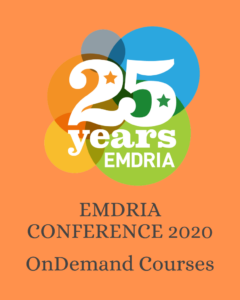Healing Racial Trauma with Somatic EMDR Therapy
This presentation will explore how to assess and address racialized trauma with EMDR therapy, enhanced by somatic approaches.
Read MoreEMDR Early Intervention & Rapid Response: Benefits of Integrating ASSYST
Participants interested in EMDR Early Interventions, rapid response, and humanitarian mental health work will be introduced to the Acute Stress Syndrome Stabilization (ASSYST) procedures in this presentation.
Read MoreContemporary JEDI’s in EMDR Treatment
A Justice, Equity, Diversity, and Inclusion (JEDI) lens is critical to effectively engaging with clients, facilitating culturally relevant interventions and effectively addressing trauma.
Read MoreUnderstanding the EMDR-IGTP-OTS Provided Both In-Person and Online
To address the COVID-19 mental health challenge Dr. Jarero and his team adapted for remote (online) use and conducted research on the EMDR Integrative Group Treatment Protocol (EMDR-IGTP) for Ongoing Traumatic Stress Remote (EMDR-IGTP-OTS-R).
Read MoreRacial Trauma in High Achievers
The Racial Trauma protocol for high achievers is designed to implement the Adaptive Information Processing (AIP) through the intersection of high achieving adults and a culturally competent lens.
Read MoreIntegrating MI & EMDR: Working with Complex Presentations and Ambivalence
This interactive workshop will introduce participants to the skills, strategies, and processes of Motivational Interviewing (MI), and its application with EMDR.
Read MorePsychedelic Assisted Psychotherapy and EMDR
This presentation provides an overview of psychedelic assisted therapy using ketamine assisted therapy to enhance the effectiveness of EMDR.
Read MoreAbordaje de los Trastornos Alimentarios desde la Terapia EMDR
EMDR para los trastornos alimentarios ayuda a mejorar el modo en el que entendemos estos trastornos y reduce el tiempo de recuperación. Este protocolo combina el trabajo con trauma, apego y disociación.
Read MoreEscenas detrás de las alas del Abrazo de la Mariposa
Las intervenciones tempranas con EMDR han sido utilizadas para ayudar a aquellos que han experimentado desastres. Estas intervenciones pueden ayudar en dos areas: tratamiento y prevención.
Read MoreUtilization of EMDR Therapy with Grief and Mourning (2020)
EMDR therapy can be used in the treatment of grief/mourning to enable assimilation of the loss and adaptive functioning in the future.
Read MoreSocial Trauma and Adversity: Restoring Connectedness and Resilience
Human beings are social animals with a fundamental need for social connectedness and inclusion. Yet many people feel they don’t fit, experience social anxiety or otherwise struggle in groups.
Read MoreEMDR with Substance Use & Co-Occurring Addictive Behaviors
This presentation provides insight into case conceptualization and treatment planning when working with clients suffering from substance use disorder and co-occurring addictive behaviors.
Read More


